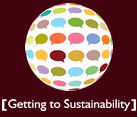8 August 2013: In an ironic but deadly serious twist on the election campaign trail, a world renowned scientist, the ex-leader of the Liberal National Party Coalition and the CEO of The Climate Institute today donned hard hats and fluoro vests to launch a new report explaining how global warming puts our prosperity, security, and health at risk.
“You can’t seriously talk about ‘A New Way’, or ‘Real Solutions’, for Australia without addressing the mounting risks to Australians’ prosperity, security, and health from a more hostile climate,” said John Connor, CEO of The Climate Institute.
“Last month we released research that shows a majority of Australians recognise climate change is here now, with nearly two-thirds concerned about the effects on food prices and insurance premiums.”
“In a new report, Dangerous Degrees, we highlight why eminent climate, health, security and economic experts say Australia and the world face mounting costs and uncertainties from even a few degrees global warming.”
Launching the report at a scientific symposium at the Australia National University, Climate Institute CEO John Connor, alongside Professor Tony McMichael and Dr John Hewson, said humanity had never lived with an atmosphere so laden with heat-trapping carbon dioxide.
“Carbon pollution in the atmosphere has risen by 40 per cent since the start of the Industrial Revolution. It’s now at levels greater than at any time for least 800,000, possibly millions of years. We are stumbling blindly into utterly uncharted territory where a few degrees make a world of difference.”
Rising carbon pollution is pushing up the global average temperature, now nearly a degree warmer than a century ago. On present trends, humanity will pump up the world’s temperature up by at least four degrees by 2100, if not well before.
“The head of the World Bank, hardly your average greenie, has said this would come with ‘high uncertainty and new risks that…can and must be avoided’,” Mr Connor said. A recent World Bank report Turn Down the Heat , showed that, unchecked, climate change will deprive millions of prosperity and undo decades of progress.
“Australia is more exposed to climate risks than any other developed nation; it is in our national climate interest to do what we can to help avoid even a two-degree warming above pre-industrial levels.”
Mr Connor said there are, however, signs of hope: there has been a boom in global clean energy, more than 80 countries—including the US and China—have policies to cut pollution, there is widespread agreement to hold warming below two degrees, and dozens of countries have priced carbon.”
Climate risk expert, Professor Roger Jones from Victoria University, said while two degrees reduced the risks, it didn’t remove them. He noted it would be unwise to be lulled into a false sense of security.
“The world is unlikely to warm slowly, gently, or steadily. Past climates, observations and climate models all show that climate change is a rocky ride. Even up to two degrees, managing the resulting risks will be difficult.”
A recent report by the Australian Strategic Policy Institute Heavy weather: climate and the Australian Defence Force (ADF) notes that climate change is likely to degrade the ADF’s operating environment; increasing conflict risk and military workload. According to the American Security Project, the defence and intelligence services of more than 100 governments now regard climate change as a growing risk to peace and security.
Economic strategist, former Liberal Party leader, and Chair of the Asset Owners Disclosure Project, Dr John Hewson, said that a failure to contain emissions risks a global economic decline that would make the current financial crisis, for all its pain, look like a blip.
“A failure to change track puts in jeopardy everything for which Australians have worked and their retirement nest eggs. On the other hand, numerous governments and businesses are beginning to invest in clean energy as well as price carbon pollution. Asset owners like superannuation funds are slowly waking up to the climate risks and if they properly manage their investments of our money for these risks, they will help drive investment and innovation in the solutions.”
Renowned public health expert, Prof Tony McMichael said that, without prompt action, climate change would erode the environmental and social foundations of good health and wellbeing.
Even with less than a degree of warming so far, Australians’ health and wellbeing has already begun to suffer:
the frequency of extremely hot days has doubled since 1960, with heat waves occurring more often, and catastrophic bushfires now more common in the country’s south-east.
“The symptoms we already see in people beleaguered by bushfire, storms, floods, and drought are the early warming signs. The risks to physical and mental health, as well as community morale, mount with every year we fail to act decisively. Yet, there is still time to avoid much additional human suffering, to realise the health benefits of action, and to restore hope,” said Prof McMichael.
Mr Connor said that while governments, including Australia, had taken some encouraging steps and made impressive pledges, it remained to be seen if their words translated into deeds matching the scale and urgency of the task.
“There is a big and growing gap between the emissions pathway we’re on and the one we need to be on to avoid unmanageable, costly climate risks,” said Mr Connor.
Mr Connor said that, for its part, Australia is faced with a challenge to manage the unavoidable impacts of climate change already in the pipeline and avoid the unmanageable dangers of even a few degrees of warming.
“The dangers and risks are clear before us, we need a framework of action and disclosure to prepare for the impacts of just a few degrees of warming and do all we can to avoid reaching two degrees warming.”
“Closing the gap between danger and relative safety is still doable, as long as we start now. Delay only means higher costs and fewer options,” concluded Connor.
– See more at: http://www.climateinstitute.org.au/articles/media-releases/dangerous-degrees-risking-australians-prosperity-security-and-health.html#sthash.e4QEdCJR.dpuf
